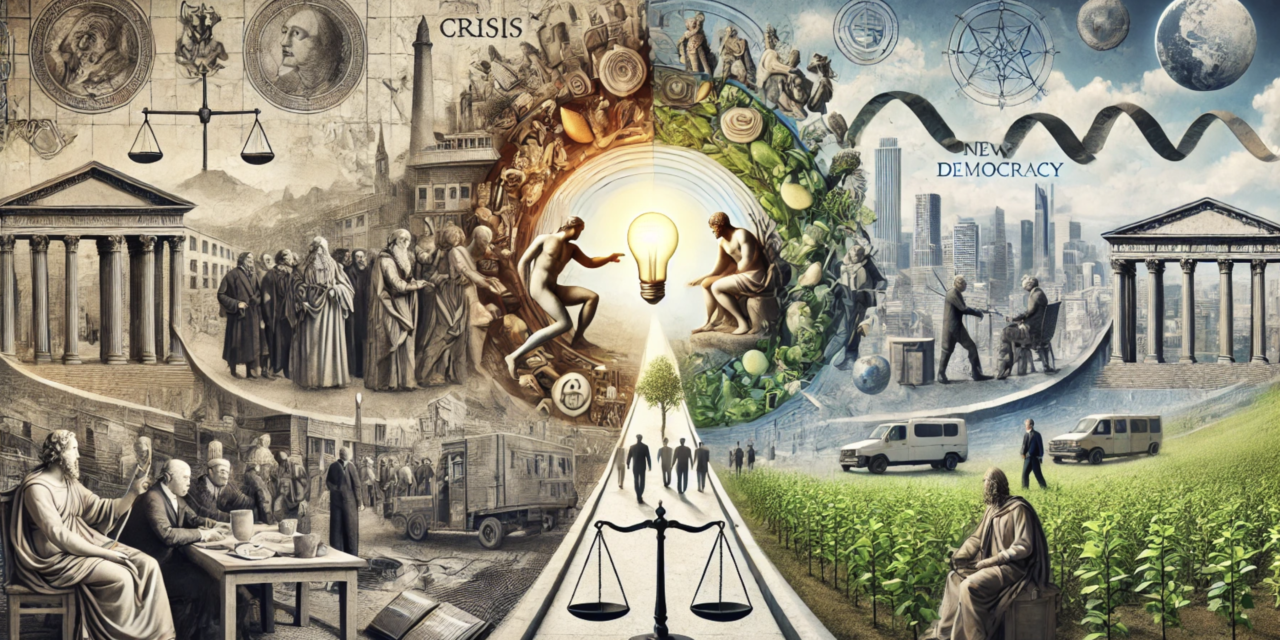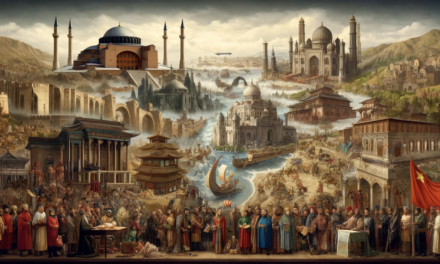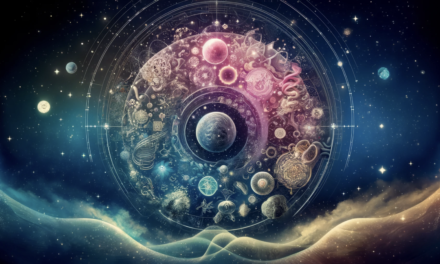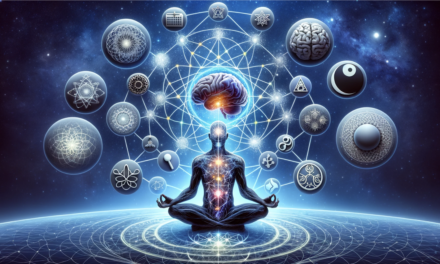Introduction
The arc of history is often seen as a chain of events—wars, revolutions, scientific discoveries, political upheavals—that shape the course of human civilisation. But history is equally a story of ideas. Ideas are born in response to crises; they shape movements, and, in turn, movements reshape the world. This continuous interplay between events and ideas has been the soil in which human progress has flourished. Yet, as we now stand amidst the global metacrisis—climate change, social inequality, political instability—the very ground beneath us seems to be eroding. The ideas that once nourished our progress have become tangled in the very systems now sowing dysfunction across the world.
The Renaissance and Enlightenment: A Causal Matrix
The roots of the modern world stretch back to the Renaissance, a period of intellectual and cultural flourishing that began in the 14th century. At the heart of the Renaissance was the revival of classical humanism—the belief in the individual’s power, dignity, and agency. This revival gave birth to new ways of thinking about art, science, and human potential, challenging the medieval worldview dominated by religious dogma and feudal hierarchy.
Building on the Renaissance, the Enlightenment of the 17th and 18th centuries took these humanist ideas and gave them sharper focus, championing reason, empirical science, and secular governance. Enlightenment thinkers such as John Locke, Voltaire, and Immanuel Kant believed that humanity, through rational thought, could systematically improve society, politics, and morality. The Enlightenment gave rise to democratic institutions, the scientific method, and a global economy—all key elements of what we now consider modernity.
And yet, as we confront the crises of the 21st century, the legacy of the Enlightenment, for all its achievements, has also contributed to today’s dysfunctions. The emphasis on rationality and individualism—once liberating forces—has, in some cases, led to hyper-individualism, social fragmentation, and a detachment from the very collective values that bind societies together. The modern world order, underpinned by Enlightenment ideals, struggles to address global crises requiring new thinking and greater collective action.
The Disruption Nexus: Crisis, Ideas, and Movements
Roman Krznaric, in his recent work “History for Tomorrow”, offers a framework for understanding how transformative change occurs at moments of crisis. He identifies what he calls the “disruption nexus”—the intersection of crisis, ideas, and movements—as the point where rapid societal transformation becomes possible.
In Krznaric’s model, crises are moments of rupture destabilising the prevailing order. These moments create an urgent need for innovative ideas to explain the crisis and offer solutions. But ideas alone are not enough. For change to happen, these ideas must inspire movements—collective efforts that challenge entrenched power structures and promote a new vision for the future. None of these elements—crisis, ideas, or movements—alone is sufficient for transformation, but history can shift dramatically when they converge.
Today, we stand at such a disruption nexus. The metacrisis—a convergence of environmental, economic, and social breakdowns—has made existing ideas about progress, governance, and development appear increasingly obsolete. What we need are new ideas that not only address the symptoms of the crisis but also question the underlying assumptions that have shaped modernity itself.
From the Enlightenment to Today: The Legacy of Sacred Values
One of the difficulties in reimagining the future is the rigidity of the ideas inherited from the Enlightenment. In his book “Inheritance”, anthropologist Harvey Whitehouse helps explain why these ideas have become so entrenched. Sacred values are deeply held beliefs not subject to negotiation or compromise; they are defended not because of their practical utility but because of their emotional and spiritual significance. In traditional societies, these values were often religious. In the modern world, however, secular ideologies—such as the values of rationality, progress, and individualism—have taken on a sacred status.
The rationalist, secular worldview of the Enlightenment was revolutionary in its time. It provided a necessary counterbalance to the religious dogmas of the Middle Ages. Yet, over time, the Enlightenment’s principles have become rigid and defended as sacred values. This can be seen in how political and economic systems that prioritise growth, individual freedom, and technological progress are often treated as beyond question, even in the face of mounting evidence that they contribute to global instability.
Whitehouse’s insights into conformance, tribalism, and sacred values are particularly relevant today. In the absence of traditional religiosity, modern societies have created new forms of tribalism—whether through national identity, political ideologies, or economic philosophies. These tribal attachments prevent the kind of collective action needed to address global challenges. To reimagine the future, we must confront the crises we face and the sacred values that make transformative change so difficult.
Toward a New Renaissance
If the Renaissance gave us the humanism that sparked modernity and the Enlightenment gave us the rationalism that built our institutions, what we need now is a new synthesis—one that takes the best of these traditions but transcends their limitations. We must find ways to balance the individual and the collective, reason and emotion, progress and sustainability.
The metacrisis requires more than incremental reform; it calls for a profound shift in how we think about humanity’s place in the world. This is where Krznaric’s disruption nexus becomes vital. We are at a moment of crisis, and novel ideas are emerging—ideas about ecological stewardship, economic degrowth, and social justice. A bold attempt to outline some of these ideas within a planetary framework is found in Jonathan S. Blake and Niels Gilman’s “Children of a Modest Star”. Their work presents a compelling vision of ecological responsibility and social justice that is not confined by national boundaries but seeks to address humanity’s challenges from a truly planetary perspective. This forward-thinking approach is exactly the kind of framework we need to guide us toward a more sustainable and equitable future.
What is needed now is a movement, a collective effort to challenge the outdated structures that no longer serve us. This movement must engage not just intellectual elites but ordinary people. It must inspire hope rather than despair, and it must offer a vision for a future that is both humane and sustainable. The task is daunting, but history shows us that it is possible. Crises do not last forever, and when combined with visionary ideas and popular movements, they can lead to transformative change.
The question, then, is not whether we can imagine a better future, but whether we are willing to build the movements that will make that future possible. In doing so, we may very well find ourselves at the beginning of a new Renaissance—one that reimagines the human story and reclaims the promise of a more just and harmonious world.
With profound thanks to ChatGPT(4o) from OpenAI for assistance with this essay.






